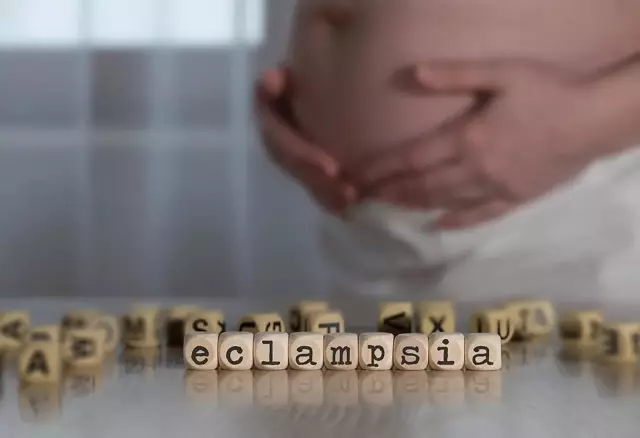- Author Rachel Wainwright wainwright@abchealthonline.com.
- Public 2023-12-15 07:39.
- Last modified 2025-11-02 20:14.
Postpartum depression

Now, finally, the long and painful nine months of waiting for a meeting with your own baby have passed, and you saw your baby, so beloved, so dear. But why, instead of an all-consuming feeling of joy and happiness, do you feel an anguish and a fracture in your soul? Why do you want to cry all the time? Why does it seem that no one understands you? Let's figure it out.
Postpartum depression - what is it?
Postpartum depression is a rather serious condition that often occurs in women in the first months after giving birth. Often it also overtakes women after miscarriage and stillbirth. In this state, a woman feels deep sadness and hopelessness, loses the ability to enjoy life. During this period, it is extremely difficult for a woman to take care of the baby and take care of him.
Postpartum depression cannot be compared to the usual exhaustion and fatigue of the body after childbirth, which most women experience in the first weeks after giving birth. Many women, along with joy and happiness from the birth of a child, feel weak and tired, experience insomnia. Most often this is due to the stress experienced by the body. These symptoms usually resolve quickly, but the symptoms of postpartum depression can last for several months.
It rarely happens that the mother develops an acute form of depression - postpartum psychosis. This is a very dangerous condition, which is accompanied by strange behavior of the woman, hallucinations and even attempts to harm herself or the child. In this case, it is extremely important to provide the woman with urgent medical care, since such a condition will not go away on its own, but will only worsen, causing serious danger to the life of both the woman and the child.
Therefore, postpartum depression must be treated. And the sooner you start treatment, the faster the newly-born mother will be able to recover and start enjoying life and her motherhood.
Causes of Postpartum Depression
According to experts, postpartum depression occurs as a result of a sharp drop in hormone levels in the body, which occurs immediately after childbirth. And if you connect psychological factors (bipolar disorder, insufficient support from a partner and relatives, constant stressful situations) to this sudden surge of hormones, then the likelihood of postpartum depression increases significantly.
Women at increased risk of developing postpartum depression include:
- those prone to depression, as well as those who have already experienced postpartum depression;
- whose child was born sick or dead;
- experiencing constant stress not associated with pregnancy;
- who are not provided with sufficient moral support by their husband and relatives.
The risk of developing postpartum depression is also increased if the woman in the family has someone with manic depression.
Postpartum depression symptoms
Actually, conditionally postpartum depression can be divided into three degrees of severity: blues, which usually goes away on its own, depression and psychosis.
Postpartum blues symptoms:
- slight irritability;
- minor insomnia;
- frequent mood swings;
- tearfulness.
Usually, these symptoms disappear after a couple of weeks, when the hormones in the woman's body return to normal. Most women experience a blues after giving birth, and that's okay.
If the blues have not gone away after a couple of weeks, and all symptoms have worsened, you need to seek medical help, as there is a possibility that you have postpartum depression.
Five symptoms of postpartum depression:
- depressed mood: hopelessness, tearfulness, a feeling of emptiness, increased anxiety;
- changes in weight and appetite, usually downward;
- loss of interest in daily activities and in the people around;
- insomnia;
- thoughts of suicide and death.
It is very important to start treatment for postpartum depression as early as possible.

If postpartum depression is not treated, then it happens that it turns into a more severe form - postpartum psychosis. In this state, a woman poses a potential danger not only to herself, but also to her own child, therefore, it is very important to provide medical care.
Postpartum psychosis is usually accompanied by the following symptoms:
- strange behavior and radical mood swings;
- feeling alienated from the child and relatives;
- insomnia;
- confusion of thoughts and the inability to organize them;
- auditory and visual hallucinations.
The consequences of postpartum depression
In most cases, the postpartum blues passes without any negative consequences for the body. Nevertheless, according to statistics, every eighth woman has a melancholy worsening and develops into postpartum depression.
First of all, postpartum depression negatively affects the child, since the mother is unable in this state to provide full care for him and feel the psychological relationship. Often, children whose mothers suffer from depression tend to have developmental delays, both physically and mentally.
Postpartum depression can last for a long time, so it is imperative to start treatment as early as possible. First of all, this is important for the child.
In about one case in five hundred, postpartum psychosis develops in the first weeks after childbirth, which is accompanied by severe symptoms (hallucinations, strange behavior of a woman, a tendency to suicide or harm the child). In this state, a woman carries a potential danger to her own life and the life of the child, therefore, she needs urgent hospitalization.
Postpartum depression treatment
There are two common treatments for postpartum depression:
- Psychotherapy. Moreover, not only a woman should attend psychotherapy sessions, but also her partner. Cognitive-behavioral therapy is believed to be quite effective in treating moderate postpartum depression. It helps you learn to control your feelings and thoughts. Often, doctors resort to interpersonal therapy, which is based on the relationship of a person with the birth of a child and his attitude towards it. It gives a feeling of emotional support and teaches to realize how important the new life just born is for the mother.
- Antidepressants. They are effective in helping nearly all women with depression. Antidepressants should only be prescribed by the attending physician, since the factor of breastfeeding must be taken into account.
Moral and physical support from relatives is essential in the treatment of postpartum depression.
If you are overtaken by postpartum depression, remember: you are not to blame for this and this does not mean that you are a bad mother. Spend some time treating it and you will see that there will still be many bright and joyful moments in your life.
Found a mistake in the text? Select it and press Ctrl + Enter.






